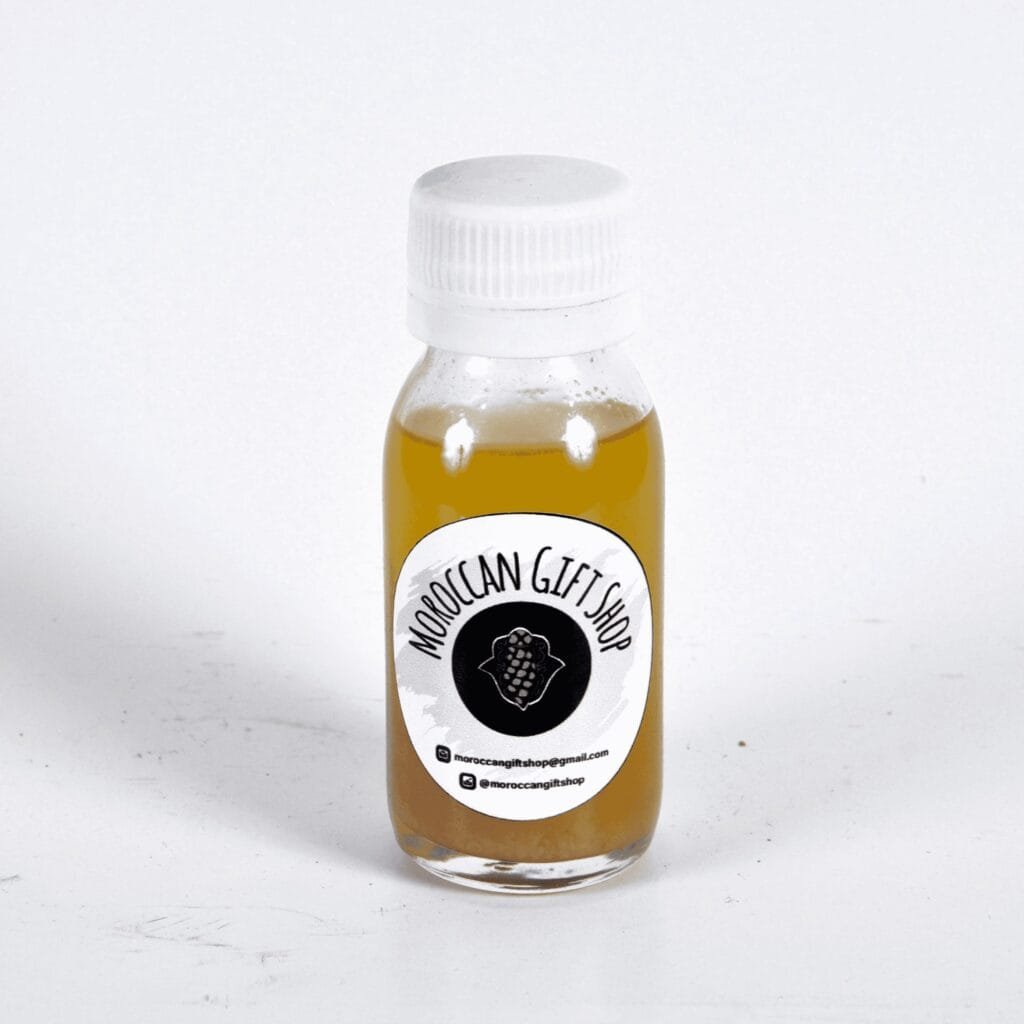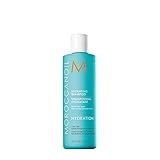
Hey everyone, it’s Brahim from moroccangiftshop.com (the best blog on the web for everything Moroccan products)! After spending decades selling Moroccan treasures like tagines, rugs, and that golden argan oil, I retired about two years ago to focus on my blog. I love sharing the ins and outs of Moroccan culture, and today, I’m tackling a question I get a lot: What’s the difference between MoroccanOil and Moroccan Oil? They sound so similar, right? But they’re totally different beasts. If you’ve ever been confused by fancy salon bottles versus the pure stuff from Morocco’s souks, this is for you. Let’s dive in with a cup of mint tea and clear things up, nice and simple.
MoroccanOil: The Brand That Took Argan Global
First up, let’s talk about MoroccanOil – capital “O,” no space. This isn’t just oil; it’s a full-on beauty brand started in Israel back in the early 2000s. They’re famous for their hair care goodies: shampoos, conditioners, styling serums, and masks. What makes them special? They use Moroccan argan oil as a key ingredient. That’s the nutty, golden oil from Morocco’s argan trees, but it’s mixed with stuff like silicones, fragrances, and other beauty enhancers to give your hair that salon-smooth shine. Think of it like a fancy cocktail – argan oil is the star, but it’s blended to create a specific vibe.
Their flagship product, the MoroccanOil Treatment, is a fan favorite for taming frizz and adding gloss. They’ve got lines for curly hair, color-treated locks, and even body products. It’s all packaged in those sleek amber bottles you see in high-end salons or department stores. As a former seller, I’ve seen how their marketing taps into Morocco’s exotic charm, but make no mistake – this is a global brand, not a bottle of pure oil straight from the source.
Moroccan Oil: The Pure, Traditional Stuff
Now, Moroccan Oil – with a space and often lowercase “o” – is what I call the real deal. It’s just another name for pure Moroccan argan oil, pressed from the nuts of argan trees that grow wild in places like Essaouira and Agadir. This is the stuff Berber women have been harvesting for centuries, cracking nuts by hand and cold-pressing them to keep all the natural goodness. No additives, no fancy scents – just pure, golden oil packed with vitamin E and fatty acids.
Back in my selling days, I’d source this oil from cooperatives in Morocco’s southwest. It’s a labor of love, and it supports local communities, especially women who run these co-ops. You can use pure Moroccan Oil for almost anything: a few drops on your skin to fight dryness, on your hair to nourish split ends, or even in the kitchen if it’s culinary-grade (roasted for that nutty flavor). Unlike the brand, this isn’t a one-trick pony – it’s a multi-purpose gem straight from Morocco’s heart.
Why the Confusion Happens
So why do people mix up MoroccanOil and Moroccan Oil? It’s all about clever branding and similar names. MoroccanOil the brand has done an incredible job of tying itself to Morocco’s mystique. Those amber bottles and ads with flowing hair make you think of desert oases and ancient traditions. But as someone who’s walked the markets of Marrakech, I can tell you the pure stuff – Moroccan Oil – doesn’t need the hype. It’s been a staple in Moroccan homes forever, long before any company put it in a bottle with a logo.
Search engines see tons of queries about “MoroccanOil vs Moroccan Oil,” which shows how the brand’s name can overshadow the traditional product. It’s like calling all tissues “Kleenex” – the brand’s fame sometimes buries the original. My goal here is to set the record straight so you know exactly what you’re buying, whether you’re after a salon product or the authentic oil.
Ingredients and Uses: Breaking It Down
Let’s compare what’s inside and how you can use each. MoroccanOil products are formulated for beauty, especially hair. Their Treatment serum, for example, has argan oil but also includes silicones like cyclopentasiloxane for that instant silky feel and dimethicone for shine. They’ve got shampoos, conditioners, and even body lotions, all designed to make you feel pampered. But these aren’t pure – they’re blends meant for specific results, like reducing frizz or boosting curls. You wouldn’t use them on your food or as a daily moisturizer; they’re for external beauty routines.
Pure Moroccan Oil, on the other hand, is unrefined and often organic. It’s just argan oil, nothing else, with all its natural vitamins and antioxidants. In my years selling, I’d tell customers how versatile it is. For hair, it sinks in deep to repair damage over time. For skin, it’s great for acne, eczema, or anti-aging since it’s non-comedogenic (won’t clog pores). And if you get culinary-grade Moroccan Oil, you can drizzle it over salads or couscous for a nutty kick. Just make sure it’s labeled for food use – cosmetic argan oil isn’t safe to eat.
Quality and Authenticity Tips
As a retired seller, I’ve seen my share of knockoffs. When buying pure Moroccan Oil, quality matters. Look for certifications like ECOCERT or USDA organic to ensure it’s the real stuff. Good argan oil smells lightly nutty, not rancid, and feels light, not greasy. Check that it’s cold-pressed to preserve nutrients. I used to work with co-ops in Agadir, and they’d show me the whole process – from cracking nuts to bottling. That’s the kind of transparency you want.
MoroccanOil the brand is consistent because it’s lab-made, but the argan oil in it is diluted, so it’s less potent than pure Moroccan Oil. Price-wise, a small bottle of MoroccanOil Treatment might cost $40 or more, while pure argan oil starts around $20 for high-quality stuff. It depends on what you value: convenience and luxury or natural versatility.
Supporting Moroccan Heritage
One thing that bugs me is when big brands use Morocco’s name without giving back to its people. MoroccanOil has made argan oil famous worldwide, which is awesome, but the real magic happens in Morocco’s rural co-ops. Those women cracking nuts and pressing oil are the backbone of the industry. When you buy pure Moroccan Oil, especially from fair-trade sources, you’re supporting their livelihoods. On my blog, I always push for ethical brands that partner with these communities. It keeps the tradition alive and honors the roots of this incredible oil.
Which Should You Choose?
So, MoroccanOil or Moroccan Oil – which is right for you? If you’re into professional hair care and want quick results, the brand’s products are a solid pick. They’re designed for ease and give that salon finish. But if you want authenticity and flexibility, go for pure Moroccan Oil. It’s a do-it-all product that’s been trusted for generations. A few drops go a long way – mix it with your lotion, dab it on your face, or use it in recipes if it’s food-grade.
For newbies, I’d say start with pure Moroccan Oil to feel its magic. Check the label for quality, and don’t be swayed by cheap imitations. If you’re curious about the brand, try their Treatment for a special hair day, but know it’s not the same as the pure stuff. Both have their place, but understanding the difference helps you shop smart.
Wrapping It Up
After years of selling Moroccan goods and now blogging about them, I love helping folks like you navigate these waters. The difference between MoroccanOil and Moroccan Oil boils down to this: one’s a branded beauty line from Israel with argan oil as an ingredient, and the other’s the pure, traditional argan oil from Morocco. Whether you’re chasing shiny hair or a natural all-purpose oil, now you know what’s what.
Swing by moroccangiftshop.com for more on Moroccan culture – from henna tips to picking the perfect tagine. Got questions or stories about argan oil? Drop a comment on my blog; I’d love to hear from you. Keep exploring, and here’s to the beauty of Morocco!
Last update on 2026-03-04 / Affiliate links / Images from Amazon Product Advertising API


